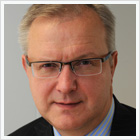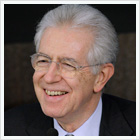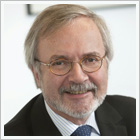|
|
 |
 |
|
|
|
|
 |
 |

|

|
An intensive examination of growth strategies at 13th Brussels Economic Forum
The 13th Brussels Economic Forum took place on 31 May. Amidst a sea of constantly changing current events, Forum participants identified both short-term and long-term strategies that can put Europe back on the path of sustainable growth. Sounding optimistic yet cautious, European Commission Vice President Olli Rehn said:“The policies of the EU have helped to contain the crisis but have not yet tamed it.” At this year’s forum, Mario Monti, Prime Minister of Italy, delivered the 2nd Annual Tommaso Padoa-Schioppa Lecture, and other prominent leaders such as Nemat Shafik, Deputy Managing Director of the International Monetary Fund, and Werner Hoyer, President of the European Investment Bank, also shared their views. Lively debates were held during the three roundtable sessions on driving growth by addressing the public finance challenges and breaking negative feedback loops, growth challenges facing the global economy, and growth-enhancing policies in Europe.
Full recordings of all presentations for viewing
|

|
 |
  Olli Rehn Olli Rehn
Vice President for Economic and Monetary Affairs and the Euro, European Commission |
 |
 |
 |
« An orderly unwinding of intra-EU imbalances is crucial for sustainable growth.» |
 |
 |
|
 |
 |
  Mario Monti Mario Monti
Prime Minister of Italy |
 |
 |
 |
«We also have to be mindful of the sustainability of fiscal consolidation.» |
 |
 |
|
 |
 |
 |
  Nemat Shafik Nemat Shafik
Deputy Managing Director, IMF |
 |
 |
 |
« My German, mother-in-law once said, everything is better with butter. In economics, everything is better with growth.»
|
 |
 |
|
 |
 |
  Werner Hoyer Werner Hoyer
President, European Investment Bank |
 |
 |
 |
« Front-loading investment is particularly important now for kick-starting growth.» |
 |
 |
|
 |
 |
 |
|
|
|
|
 |
 |
 |
 |
Taming the crisis
Olli Rehn sounded a hopeful, if sober, message in his address opening the Brussels Economic Forum. Rehn, who is Vice President for Economic and Monetary Affairs and the Euro, said: “We are still in very troubled waters, despite the fact that the EU has taken unprecedented action to safeguard fiscal stability. The policies of the EU have helped to contain the crisis but have not yet tamed it.”
|
 |
|
 |

|
|
 |
 |
 |
 |
Monti pushes for the Single Market and investment
Mario Monti, delivering the Second Annual Tommaso Padoa-Schioppa Lecture at the Brussels Economic Forum, underscored the role of investment and a stronger Single Market as the keys to growth in Europe. “The further development of the Single Market is one, and maybe the key to further European growth,” according to Monti, Prime Minister of Italy. He said that the focus should not only be on how to best re-launch the Single Market as a factor for integration but also on how to develop it as a factor for growth.
|
 |
|
 |

|
|
 |
 |
 |
 |
What can be done to help Europe’s struggling economies?
Can anything be done to help European Union Member States mired in recession and struggling with unemployment? Panelists participating in the debate entitled “Addressing the public finance challenges and breaking negative feedback loops” were divided.
|
 |
|
 |

|
|
 |
 |
 |
 |
Please pass the butter!
“My German, mother-in-law once said, ‘everything is better with butter’. In economics, everything is better with growth,” said Nemat Shafik, Deputy Managing Director of the International Monetary Fund (IMF). Shafik delivered the keynote address at the Brussels Economic Forum. She said that even a few tenths of a percentage point gain in growth makes everything easier: fiscal consolidation, debt reduction, and poverty alleviation.
|
 |
|
 |

|
|
 |
 |
 |
 |
Time to re-focus on the real economy
Brussels Economic Forum participants suggested a variety of solutions for the economic crisis. "It's time to place full employment centre stage once again," Deepak Nayyar, Professor of Economics at Jawaharlal Nehru University, told the Brussels Economic Forum. "We have to shift focus from the financial sector to the real economy”. Beatrice Weder di Mauro, Professor of International Macroeconomics and member of the board at UBS, put forward technical solutions for the crisis. "In the long run and possibly much faster, the euro area needs a banking union”, she said. It would, she said, be an “absolutely crucial element for decoupling sovereign [debt] from banking [debt] at a national level”.
|
 |
|
 |

|
|
 |
 |
 |
 |
Growth enhancing policies: more than just structural reforms
Panelists in Session III of the Brussels Economic Forum: “Growth enhancing policies in Europe – which way forward?” felt that structural reforms could have a positive impact on growth, even in the short-term, but that several other growth drivers should be taken into account as well, including the Single Market, macroeconomic rebalancing and the EU budget.
|
 |
|
 |

|
|
 |
 |
 |
 |
The European Investment Bank: front-loading the recovery
“The EIB can be one element of the solution but it is not the solution itself,” said European Investment Bank (EIB) President Werner Hoyer, downplaying expectations at the close of the 2012 Brussels Economic Forum. Nonetheless, the EIB is “exceptionally well placed” to restart growth in Europe in general and Europe’s periphery “in particular”, Mr Hoyer said. Human capital development, climate policy and investments in mature renewable technology and energy efficiency remain key among the bank’s focuses.
|
 |
|
 |

|
|
|
|
|
|

|
|
Directorate-General for Economic and Financial Affairs
|

|
|
